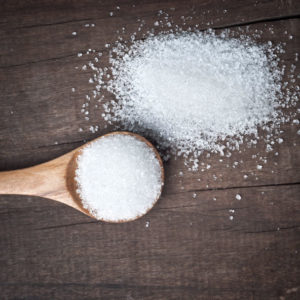 Sugar is a cheap addictive additive to many of the man-made foods we eat.
Sugar is a cheap addictive additive to many of the man-made foods we eat.
Babies become hooked on it very early, as it constitutes about 50% of some brands of formula.
It is a major ingredient for supposedly healthy vitamin-packed meal substitutes, ranging from Ensure to Slimfast.
It is put into ketchup and spaghetti sauce, peanut butter and bread, and of course in jams and jellies.
Our bodies know how to metabolize naturally-occurring unrefined carbohydrates in fruit, vegetables, and grains.
They don’t know how to handle the overwhelming quantities of the new, cheaper, form of refined high-fructose corn sweetener that is now more commonly used in place of sucrose.
I have been trying to struggle through Nancy Appleton’s book “Suicide By Sugar” to give you the key points, but it has boggled my mind.
There are so many ways that added refined carbohydrates disrupt the chemical reactions your body depends on.
All I can do, to keep this page reasonably short, is to summarize a few of the key points from my own personal experience.
If you are having a problem with weight gain, refined carbs are at least half the problem.
If, after eliminating meat, poultry, and dairy foods, you are still having problems with excess weight, emotional ups and downs, high energy followed by no energy, then sugar and other refined carbohydrates (white flour, white rice, etc.) are most likely close to 100% of the cause.
My advice would be to get the sweets and refined carbs OUT of your diet.
You will feel much better.
I know – I’ve been there!
Sugar is addictive
As humans, we are naturally attracted to sweet tastes.
Our tastebuds tell us that fruit and cooked starches are good sources of food, so it is natural that we eat them.
Fruit and starchy grains and tubers have fiber in them, which slows the rate at which the carbohydrates enter our bloodstream.
This lessens their impact on our metabolism.
Refined carbs are an entirely different matter.
All the redeeming virtues that fruit and starches contain – apart from their sugar content – have been removed.
Gone are the vitamins, minerals, enzymes, and the fiber.
All that remains is the short-lived rush of energy that causes a brief feeling of energy and euphoria, which soon gives way to fuzzy-headed-ness, depression, tiredness and a hunger for more.
High fructose corn syrup, which is commonly used in place of sucrose, is the ideal food additive because it makes us want to eat more.
Packaged foods manufacturers play us like a violin, adding high, sweet notes to make us eat more…playing the salty notes we sometimes crave…and smoothing the impact with a bit of fat.
If we allow ourselves to be taken in by this seductive music, we become putty in the hands of food processors.
They get our money, for all the less-healthy foods, and we get fat or – at the least – another push in the direction of diabetes, heart disease, cancer, and dementia.
Not everyone is equally susceptible to the effects of sugar.
I have read that perhaps 20% of the U.S. population is able to enjoy refined carbohydrates without the weight gain and the extreme emotional effects.

That doesn’t indicate that they will never get diabetes or heart disease or cancer.
I write from the point of view of one who is extremely susceptible to refined carbohydrates and the problems they cause.
I learned through trial and error that the only way to feel my best and maintain a high energy level to do the endurance sports I enjoy, was to avoid sugar in all its many disguises.
The short-term pleasures of chocolate or ice cream or pecan pie and not worth the unpleasant after-effects.
It is incredible that the average American now consumes about 150 pounds of sugar a year.
Much of it is fructose, which is causing much of the bloated, puffy-looking appearance of many in the younger generation.
Fructose is cheaper than cane and beet sugar because it is subsidized by the U.S. government.
Consuming fructose has been shown to cause forty times the fat storage that glucose does, according to Dr. Mercola.
I understand that Europeans call Americans balloon-people because of our inflated size.
I see what they mean.
It is very noticeable when I run into people I grew up with.
Over the years, they have grown fat and are dealing with various medical problems related to their diet and weight.
I am about the same size or a little lighter than I was in high school.
It is very clear that the turn away from the standard American diet I took when I was twenty has spared me from a life of growing medical problems and premature aging.
You may read this and feel that you don’t want to give up the pleasures of eating foods I have identified as fattening and unhealthy.
That is your choice to make.
My purpose here is just to give you the facts of what sugar is doing to your body, both externally and internally.
I’d like to encourage you to be your best, but that is your choice to make.
The bottom-line question for you is: Will advertisers and their cheap pleasures such as sugar dominate your life?
Or are you in control of yourself – doing the best for your long term success and health?
Advertisers and food processors want you to believe that a little of their sweet poison isn’t harmful.
Don’t believe them…They SELL the stuff!
They want your money – and, if your health goes too. Well, that’s too bad.












